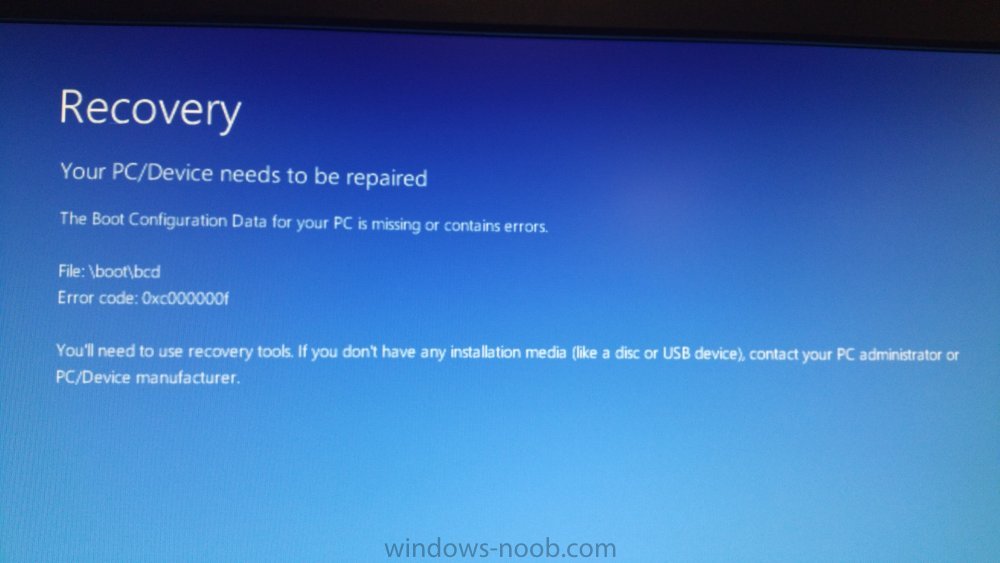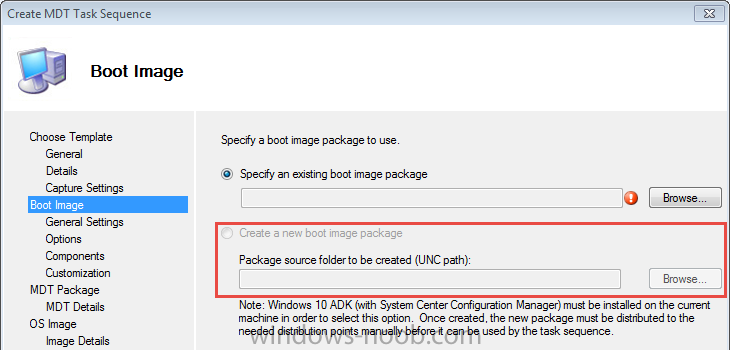Search the Community
Showing results for tags 'boot'.
-
Hi everyone, I'm going to tell you my problem if you can help me !!! My environment: Sccm 2012 I have to distribute windows 10 and I am testing with a virtual machine. I configured the DP by enabling the PXE and not WDS. DHCP configured (66-67) When the boot starts on the client I get the error you see in the attached file. Also on the SMSPXE.log file comes the message: not able to open SMSBoot \ x86 \ wdsnbp.com I don't know what to do anymore .... help me thank you very much!
-
I was attempting to create a new boot image (testing concept) and the following error message occurred after the WIM loaded. The following file is missing or corrupt.... 0xc0000359 megasas2.sys I am using a 64 bit boot image, with the Dell WinPE driver cab (v10) loaded. What is causing this issue?
-
Hi All, I installed SCCM 1706, SQL 2016, ADK for Windows 10 (version 1703), and MDT 8443 on a Server 2016 VM, and I followed this guide https://www.windows-noob.com/forums/topic/12873-how-can-i-deploy-windows-10-enterprise-x64-with-mdt-2013-update-1-integrated-with-system-center-2012-r2-sp1-configuration-manager/ because I wanted to deploy Windows 10 with SCCM. I was able to deploy Windows 10 to a Hyper-V VM using PXE, but I couldn't make it work on an actual laptop or desktop (both HP). I got the following blue screen after pressing F12. I've disabled and re-enabled my distribution point's PXE support for clients, added network and storage drivers to the MDT boot image and updated distribution points, but nothing worked. Does anyone have any idea why it works for VMs but not actual machines?
-
HTTPS to HTTP issues
jtelling posted a topic in System Center Configuration Manager (Current Branch)
Running into an issue that I cannot wrap my head around. We recently switched from HTTPS to HTTP and now clients will not talk to remote MPs or DPs on Secondary Sites. Talking back to MP on Stand Alone Primary works fine. I have revoked certs from CA and removed certs from servers but all of my Secondary sites are having issues with MPs and DPs (no PXE Boot Filename Received). Also removed Secondary Site, WDS, WSUS, all prereqs and reinstalled. Tried PXE booting to WDS + MDT 2013 and that works, but once SCCM PXE boot is turned on, I get the error. Boot images are distributed to DPs and Task Sequences have correct boot image assigned. Has anyone run into this type of problem before? Everything looks fine the mpsetup.log and mpcontrol.log files. MPControl.log STATMSG: ID=5460 SEV=I LEV=M SOURCE="SMS Server" COMP="SMS_MP_CONTROL_MANAGER" SYS=KEL-APPS.******.****** SITE=KEL PID=2840 TID=5188 GMTDATE=Mon Mar 13 16:23:37.001 2017 ISTR0="" ISTR1="" ISTR2="" ISTR3="" ISTR4="" ISTR5="" ISTR6="" ISTR7="" ISTR8="" ISTR9="" NUMATTRS=0 Successfully performed Management Point availability check against local computer. Applied D:P(A;CIOI;GA;;;SY)(A;CIOI;GA;;;BA)(A;CIOI;GR;;;LS)(A;CIOI;GR;;;S-1-5-17) to folder C:\Program Files\Microsoft Configuration Manager\Client SSL is not enabled. Call to HttpSendRequestSync succeeded for port 80 with status code 200, text: OK Sent summary record of SMS Management Point on ["Display=\\KEL-APPS.******.******\"]MSWNET:["SMS_SITE=KEL"]\\KEL-APPS.******.******\ to \\KEL-APPS.******.******\SMS_KEL\inboxes\sitestat.box\7d1dtt14.SUM, Availability 0, 733641724 KB total disk space , 681200880 KB free disk space, installation state 0. Http test request succeeded. STATMSG: ID=5460 SEV=I LEV=M SOURCE="SMS Server" COMP="SMS_MP_CONTROL_MANAGER" SYS=KEL-APPS.******.****** SITE=KEL PID=2840 TID=5188 GMTDATE=Mon Mar 13 16:28:37.013 2017 ISTR0="" ISTR1="" ISTR2="" ISTR3="" ISTR4="" ISTR5="" ISTR6="" ISTR7="" ISTR8="" ISTR9="" NUMATTRS=0 Successfully performed Management Point availability check against local computer. SMS_MP_CONTROL_MANAGER 3/13/2017 12:28:37 PM 5188 (0x1444) -
Hi all, I have my own lab in running on my Macbook Pro (mid 2015). I'm using vmware Fusion 8 pro and almost everything works fine. When I try to run a task sequence to build and capture it fails when the step is "capture" because the network driver is not loaded. Actually I added two network drivers to my boot image: from vmware and intel 82574L (which is the one that is not loading). Nevertheless, the computer restart and start loading the boot image to capture the windows, but fails immediately and I'm out of options. Does any one had this issue before? The driver is not digitally signed but was correctly injected to the boot image. note: the driver is correctly loaded when I'm booting from the network (pxe) and I can't copy the log because I don't have any driver loaded... no network nor copy paste basic functions... Any help will be much appreciated!!! Thanks in advanced!
-
Hey Guys - Recently started at a new position where I am primarially working with an SCCM 2012 1511 environment which was set up over the past month. Yesterday, I requested that MDT 2013 be installed and once I got approval, installed MDT 2013 Update 2 on the primary then ran the integration tool successfully. This morning, I went to create the MDT packages which I usually do by creating a test MDT client task sequence. When doing so, I get to the MDT Boot Image page, but cannot select the option to create a new boot image!?! As I didn't install SCCM, I don't have specifics, but was told Windows 10 ADK was installed - just the 4 components required. Any ideas / thoughts? Thanks!
-
Hey all, I'm at my wits end here. I'm trying to add support for a new generation of laptops to my SCCM 2012 R2 TS. I have already gone through the trouble of gathering all the required drivers for the new models and created new Driver Packages only to find that the new models all use a newer\different NIC driver than the previous generation. No big deal I think, I'll just create a new boot WIM for testing, get the appropriate drivers for WinPE and I'm good! Well, not so fast. For some reason when I add the new boot WIM to my testing Task Sequence and try to PXE, the machine is unable to pick up the OSD deployment. If a revert back to the original boot WIM in the same TS it picks up, but there are no NIC drivers. I've pretty much narrowed it down to being some sort of issue with my new boot WIM but can't seem to figure out what. I'll be upfront and say that I have not had to create a new boot WIM before so it's possible I FUBAR'd something during this process. I just used the "Add new Boot WIM" function and pointed the wizard at the Win ADK supplied boot WIM. If that's not right, maybe someone can point me in the right direction. I've confirmed the new boot WIM is at my local DP the new boot WIM is the same version as the working one, WinPE 5.0 (6.3 \ Win 8.1) I've confirmed my drivers are the appropriate version and architecture and the correct model I can't even get any logs because when I use the new boot WIM it doesn't get past PXE. Below are the last few lines of the PXE before the machine reboots: Message from Administrator: Configuration Manager is looking for policy Contacting Server: [local DP IP]....... TFTP Download: smsboot\x64\abortpxe.com PXE Boot aborted. Botting to next device... PXE-M0F: Exiting Intel Boot Agent
-
What is Significance of MSR, SYS, EFI partitions for Win 8.1 Native Boot VHD? How? I ask because I've built and native booted several variations of Win 8.1 VHDs on target SPro 3. I'd like to know pros & cons. CONTEXT: So, with a lot of help and input from multiple amazing people from multiple forums and coming closer to the goal of my project. I have found and tested the ways and means to complete the steps in my project. Some interesting questions and thoughts have come up. (http://forums.mydigitallifeSPAM!/threads/62362-Virtualize-Win8-1-BIOS-MBR-Physical-Partition-gt-to-gt-WIM-Image-gt-to-gt-UEFI-GPT-VHD?p=1085352&viewfull=1#post1085352) PROJECT MILESTONES SO FAR: A - Was able to find articles that help bypassing Sysprep errors on Win 8.1 Did some extensive Driver Cleaning/ Reseting from OEM/Intel/Non MS drivers to MS Win 8.1 native drivers e.g. Prototype sample runs involved Sysprepping Fresh Win 8.1 installs while eliminating issue causing Metro App packages. B - Played with DISM, Disk2VHD, GPTGEN in various configurations with Win 8.1 e.g. Prototype sample runs involved imaging Fresh Win 8.1 MBR/ BIOS installs and converting or applying them to GPT/UEFI VHDs and native booting them in Step C C - Have been able to Native boot Win 8.1 VHDs using BCDBOOT: QUESTIONS & DECISIONS about MSR, SYS, EFI Partitions on Win 8.1 Native Boot VHD: I am left with some final decisions to make and questions.. Before I apply my Customized_Windows.WIM... What kind of Partitioning structure should I CREATE IN/ FOR my FINAL VHD? I ask because I've built and native booted several variations of Win 8.1 VHDs on target SPro 3. Some with Single Partition Volumes and others with Sys+EFI etc. OPTIONS/ EXAMPLES of Sample VHDs executed & installed on Surface Pro 3: [:\Windows] DISM Installed Natively [sys:300M][EFI:100M][:\Windows] Vanilla Install via Hyper V Possibly also doable using VDisk commands via Native Install as well. I guess. Also, during this Vanilla install it was trying to create the MSR partition in addition to the above. I did read about the MSR, SYS, EFI partitions online as well as how OSes can also run without those. https://technet.microsoft.com/en-us/library/dd799232(v=ws.10).aspx https://technet.microsoft.com/en-us/library/dd744301(v=ws.10).aspx Also, if ever V2P for Upgrading to Win10 and then P2V again There were some workarounds posted on Technet (need to find link, will find and post) as Windows cant upgrade on Native Boot VHD. BOOT BCDBOOT QUESTION: With single partition volume VHDs, its simple & clear how to APPLY and USE ..BCDBOOT. With these SPECIAL PARTITIONS, I am curious what would the best way to "direct" BCDBOOT > > > ?? From where to where? https://technet.microsoft.com/en-us/library/hh824874.aspx https://technet.microsoft.com/en-us/library/gg577238.aspx EXISTING HARDWARE PARTITION VOLUMES: SPro 3 HDD (UEFI Only): [sys:350M][EFI:200M][:\Windows][Recovery:5GB] X61T HDD (BIOS Only): [:\Windows]
-
Hi, Currently our manufacturing department is using a physical machine with linux on it serving PXE bootable memtest86+ to the local subnet. They have been managing this server themselves aside from the IT department because we don't really support linux at this time.. but now the person who knew how to use it left, and it stopped working... So now its been put back into IT's hands to get this thing going... and if I need to, I will fix the linux side.... but I would MUCH rather use our existing SCCM setup for this and NOT have multiple PXE/DHCP servers So does anyone know a way to use SCCM to boot into PXE and be presented with memtest86+ to test the memory in that client machine? (this could then be added you the various tutorials on this site because many people would love a way to boot into iso live linux distributions) Here is the linux example: http://wellsie.net/p/286/ Any help is greatly appreciated!
-
Hi Guys, I'm trying to make an MDT Boot Image in SCCM but everytime I try to it just errors out part way through. I've tried reinstalling MDT/WADK and removing/installing the MDT ConfigMgr integration but it hasn't made any difference. Any ideas? Started processing. Creating boot image. Copying WIM file. Mounting WIM file. WIM file mounted. Setting Windows PE system root. Set Windows PE system root. Set Windows PE scratch space. Adding standard components. Adding component: winpe-dismcmdlets Error while importing Microsoft Deployment Toolkit Task Sequence. System.ServiceModel.CommunicationObjectFaultedException: The communication object, System.ServiceModel.Channels.ServiceChannel, cannot be used for communication because it is in the Faulted state. Server stack trace: at System.ServiceModel.Channels.CommunicationObject.ThrowIfFaulted() at System.ServiceModel.Channels.ServiceChannel.Call(String action, Boolean oneway, ProxyOperationRuntime operation, Object[] ins, Object[] outs, TimeSpan timeout) at System.ServiceModel.Channels.ServiceChannelProxy.InvokeService(IMethodCallMessage methodCall, ProxyOperationRuntime operation) at System.ServiceModel.Channels.ServiceChannelProxy.Invoke(IMessage message) Exception rethrown at [0]: at System.Runtime.Remoting.Proxies.RealProxy.HandleReturnMessage(IMessage reqMsg, IMessage retMsg) at System.Runtime.Remoting.Proxies.RealProxy.PrivateInvoke(MessageData& msgData, Int32 type) at INewBootImage.Create(String platform, String scratchSpace, String[] components, String[] extraContent, String wimFile) at NewBootImageClient.Create(String platform, String scratchSpace, String[] components, String[] extraContent, String wimFile) at Microsoft.BDD.Wizards.SCCM_ImportTaskSequenceTask.DoWork(SmsPageData smspageData, Dictionary`2 data)
-
SCCM 2007 SP2 It all started when we got the new machine model in our organization. Ran the task sequence, In the SMSTS log I found Failed to download pxe variable file, which pointed that PE was missing Network driver. Went into Boot images, right clicked and added the network driver for the model. Update Image to DP, Failed. Tried to remove the driver, update to DP failed again. Tried to add a new Boot image, failed with finalized image required error. Could you please help? Do I need to uninstall WAIK? If yes, is there any prerequisite or precaution I should take before doing it on Production server? Is Any instruction document available? Please help.
-
At first I attempted to add drivers to a specific boot WIM and then updated the DP but got an error. Researched the error couldn't find anything, so I decided to update one of the other boot WIMs which we have and same thing (this time I didn't even try to add drivers, for one of them I even deleted the drivers and then update the DP) Here is the error I get. Error: Boot image to update: MDT Custom PE Error: Actions to perform: Add ConfigMgr binaries Disable Windows PE command line support Add drivers Error: Failed to import the following drivers: Error: The wizard detected the following problems when updating the boot image. Failed to install required packages into to the boot image Failed to install required packages into to the boot image Failed to install required packages into to the boot image Failed to install required packages into to the boot image Failed to install required packages into to the boot image The ConfigMgr Provider reported an error.: ConfigMgr Error Object: instance of SMS_ExtendedStatus { Description = "Failed to insert OSD binaries into the WIM file"; ErrorCode = 2152205056; File = "c:\\qfe\\nts_sms_fre\\sms\\siteserver\\sdk_provider\\smsprov\\sspbootimagepackage.cpp"; Line = 4262; ObjectInfo = "CSspBootImagePackage::PreRefreshPkgSrcHook"; Operation = "ExecMethod"; ParameterInfo = "SMS_BootImagePackage.PackageID=\"LUW00022\""; ProviderName = "WinMgmt"; StatusCode = 2147749889; };
-
Hi everyone, I know it's possible but I don't know how to do that and I don't find the answer or my keyword search is not good... So I create a bootable ISO with a TSequence media wizard using bootable media... the way to deploy wim across the network. But now I want to put the Wim file on my ISO boot file (on a usb key after...) and modify the TS to get the wim directly on the ISO and not on the network.... how can I do that ?? I'm on SCCM SP2 R3 and try to deploy Windows 7 x64. It works fine on a network but with the wim file on the key I can optimize time to create workstation... Thank's for help !! Slash
-
Hi, I am having a very strange error crop up while testing the deploy and capture of a boot OS via a task sequence. The error occurs on x86 or x64, on VM's or physical clients. SCCM 2012 is installed per the fantastic tutorial here and this error is appearing on part 7. When deploying the boot image to the target pc, the PE environment loads and immediately resets the client pc with this error: Failed to run task sequence - An error occurred while retrieving policy for this computer (0x80004005) After some searching around I found and tried these: Link 1: Permissions & Link 2: Certificates Unfortunately, neither helped. I have granted sufficient permissions to client systems to access the boot.wim image and the only certificate available is loaded into SCCM and is unblocked. Its difficult to be 100% sure re the certificates issue, as that link is to a 2007 SCCM structure and I think that Admin.\Security\Certificates would be the corresponding location in 2012. At this point I have reinstalled the distribution point, setup new boot images for both x86 & x64, created new tasks and sent them out to the clients and still ... nothing. Clients are still restarting immediately after the PE loads. I have tried to look at the smsts.log on the clients, but they are listed as empty, so cannot. The smspxe.log file reports business as usual with no unusual\error based behaviour. Any ideas anyone or anyWeb? At this point I am at my wits end, but need to continue regardless... Cheers & Thanks
- 2 replies
-
- distribution point
- dp
-
(and 8 more)
Tagged with:
-
Greetings all, This is a great website! I am testing an implementation of SCCM2012 RC2 and all task sequences are failing regardless of what task I attempt. I've attached the log file from the pxe booted machine. From what I can tell, WinPE is unable to communicate with the MP (MNCMP.OTC.EDU). The test environment is running native mode. The machine is getting an IP address. Any thoughts? smsts.log
-
Who cleared the PXE flag??
Christian1805 posted a question in Troubleshooting, Tools, Hints and Tips
Hi everybody! We have a SCCM 2007 R2 environment with nearly 20 secondary sites under 1 central site. Now it comes to security permissions delegations to the local admin at the local sites that they can do their Windows 7 Rollout. I created a security structure in SCCM with a flat hierarchie of groups in the AD. For the moment it works fine. A few days ago we had the situation that seems to clear all PXE flags to the "All Systems" collections. Many machiens that will get an OS over a Task Sequence were still in the OS Deployment collection (mandentory advertised), that means that these machine would have get a new OS after the next PXE request (default value!). In the end nothing happens, because we noticed that very fast. I just stopped our local WDS Service and deleted the direct membership of the machines in the OSD collections. Pig had I'm very scared about that, because the next time that happens we may be not so fast. The first question that I have: How can I figure out who deleted the PXE flag? I searched in several log files, queried the Status Messages, but nothing. Anybody knows where I can find that? The second interesting is: How can I prevent that a delegated user (also like everybody!) can clear the PXE flags on a completly collection?? (What also might be possible to use a script that the direct membership of the computers will be deleted after a successful OSD. I guess I saw somewhere a script like this...) Thanks in advance! Christian





